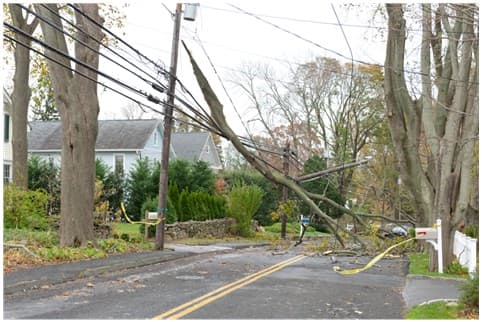Coping with Hurricane Sandy | Beyond Hurricane Insurance
- Check your homeowners insurance policy to make sure you have sufficient coverage.
- Check with your mortgage servicer for any types of relief available for your mortgage.
- Community help is also important to recover from hurricanes and natural disasters.
Standing Strong in the Tail of Hurricane Sandy
Our hearts go out to the many families who suffered through Hurricane Sandy. Bills.com extends its condolences to those who suffered losses, wishes a speedy recovery to those who were injured, and salute to all the brave people who risked their lives to maintain order and safety for the millions affected by Hurricane Sandy.
We prepare for many things in life. However, many events are beyond are control, and the power of a hurricane is one example, as it spreads its power or destruction tearing downs homes, electricity, and the utilities and transportation we are so dependent upon.
However, picking up the pieces and going on with life is a necessity for us all. Hurricane Sandy may be over, but many people still have to deal with getting everyday life back into order, including getting to their jobs, rebuilding homes and stores, paying debts and numerous other chores.
Hurricane Insurance Tips
In order to help you or ones you know and love Bills.com has gathered some tips about dealing with your homeowner insurance:
- Check your Homeowner Policy and see what it covers: Usually, homeowners insurance covers damage against windstorms, hail, and lightning. It doesn't cover earthquakes, volcanoes, or flooding from hurricanes. If you live in an area with potential hurricanes and flooding, then check with your agent about coverage through the National Flood Insurance Program. If you receive federal assistance after a hurricane, you won’t be covered without flood protection.
- There are different rates for low-risk areas. Check with your agent.
- Mortgages often require special coverage for areas in high risk. Nevertheless, if you don’t have a mortgage, don’t leave yourself unprotected.
- Remember, insurance doesn't cover market value but replacement value. Make sure that you are paying for the right type of coverage.
Hurricane Sandy – Getting Mortgage Relief
Freddie Mac and Fannie Mae issued guidance to their lenders regarding special regulations and procedures for dealing with borrowers affected by Hurricane Sandy. This includes borrowers who have not yet received their loans and borrowers who are paying back their mortgages. Although much of their announcement is technical, keep in mind these points:
- Disaster Area: Disaster areas change and are defined on the Federal Emergency Management Agency (FEMA).
- New Loan: Age of Credit and Appraisal Documentation: Lenders can accept documentation for certain eligible Mortgage loans (for property in a FEMA designated area eligible for individual assistance) for an extended period, up to 180 days before the note date. This includes a property valuation and underwriting criteria.
- Existing Loan
- Forbearance: For certain eligible loans (in designated area and borrower current or less than 90 days delinquent, then the lender can, at its own discretion, offer up to a 12-month forbearance.
- Discontinuance of Legal Action: A 90-day moratorium for eligible loans against beginning or continuing legal action, until the lender reviews the property's condition and the borrower’s employment and income status.
- Insurance claims: Servicers must take action to protect the borrower’s interest when a hazard or flood insurance loss occurs.
- Waiver of late fees: If payments are caused by hardship due to a natural disaster, then the late fee should be reported. • Reporting to Credit Bureaus: If forbearance is granted, then lenders should suspend credit reporting.
Fannie Mae’s and Freddie Mac's guidelines do not apply to all loans. However, no matter what type of mortgage loan you have, make sure that you work closely with your servicer. Demand to know what your rights are and that you are treated fairly. Make special care to get clear instructions regarding processing your insurance claims.
Hurricane Damage: Beyond Hurricane Insurance - Community Help
Homeowner's and property insurance is an important protection against mishaps. Hurricane and other natural disaster insurance is an additional safety measure to cover potentially serious damage. However, beyond getting hurricane insurance, there are tons of organizations helping victims of Hurricane Sandy.
